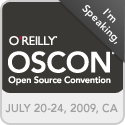A lot of folks are unclear on the subtleties of free software and open source. Mike Hogan writes a blog article”Is Hybrid Licensing of OSS Hypocrisy?” to try to shed some light on this. With respect, I think he has missed part of it.
We’re talking about two orthogonal things here. One is open-source versus closed-source, and the other is whether we charge money for software licenses or not. As Mike points out, the former is about development methodology. The latter is about business model.
There ought to be nothing wrong with charging money for open-source software. In fact, there isn’t — even the GPL permits this. This is related to the origin of open-source in the Free Software movement. “Free software” to them is about what the user is licensed to do with that software, not whether they paid anything to license it. In fact, some companies package free software and charge for it (presumably with some added value).
The marketing interpretation of “free software” is the “free chips & salsa” concept Mike mentions. It’s a way of encouraging the market to adopt this product. It’s a loss leader, usually followed by upselling the customer with other products or services.
There’s also a case for no-charge versions of closed-source software. Typically these have either limited features (“crippleware”) or they expire after a limited time (e.g. “demo”).
Few companies have found a way to use open source methods to develop full products they then charge money for. But this could simply be because it’s hard to drive adoption of any software product, regardless of whether it’s open-source or closed-source.
On the issue of hybrid licensing, I see this as no hypocrisy; I see it as more freedom. If I develop some code, offer it under the GPL license, and you use my code as part of your project, then you are obligated to license your project with a GPL-compatible license. This is termed the “viral” nature of the GPL license, and it’s clearly intended to promote the free software movement.
What if you don’t want to adopt a GPL-compatible license for your project? Well, no one is forcing you to use my code. But my code is really amazingly good, and you want it. You want it so much that you’re willing to give me money if I grant you a license to use it under different terms. If I’m willing to do that, now you have more freedom — you can choose to contribute your own code to the body of free software in the world, or you can choose not to. But the latter choice may have a different price tag associated with it.
This should still promote the principles of the free software movement. It would be wrong to charge someone for their freedom. But in the hybrid license model, you can avoid paying for a license simply by joining the movement, by spreading the freedom. If you want to stick to your closed-source model, you can pay for the privilege of using my code in that way.
I don’t see any hypocrisy in a software maker using a hybrid licensing model, as long as they are consistent and honest about it.

